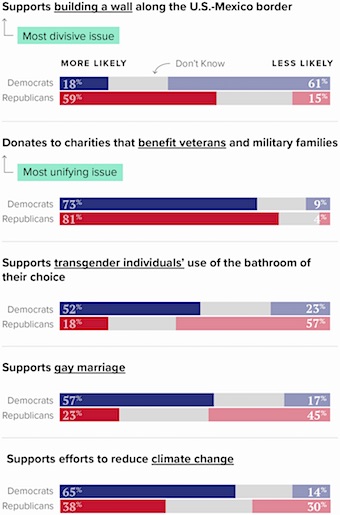Americans love it when companies take stances on social or political issues, but brands that throw their hat into the political ring run as much of a risk alienating consumers as they do increasing engagement, according to a recent survey conducted by digital politics and policy outlet Morning Consult.
Morning Consult’s survey, which asked Americans the extent to which they care about a brand’s involvement in social and political issues, found that a majority of all consumers — 59 percent of Democrats and 55 percent of Republicans — consider a company’s stance on a social or political issue important when buying a product or service. And nearly half — 49 percent — of all respondents said they care about donations made by businesses insofar as going to causes they believe in.
 |
Of course, making partisan or controversial political alliances always runs a great deal of risk. Three-tenths of all consumers polled said they’ve boycotted a brand or abstained from purchasing a product or service because of its stance on a political or social issue, and nearly a third of those consumers — 29 percent — said they’ve done so in the last year. Nearly three-quarters of those who have done so — 74 percent — said they continue to boycott that brand.
Some topics make bigger waves than others, depending on the audience. Democrats are particularly driven to purchase a product or service if a company supports efforts to reduce climate change (65 percent), and a similar number (63 percent) said they’re wiling to do the same for a company that donates to Planned Parenthood. Republicans, by contrast, are least likely to purchase from a business that calls President Donald Trump a "racist" (61 percent) or supports transgender individuals’ use of the restroom of their choice (57 percent).
Perfectly illustrating how ideologically split the country has become is the audience divide surrounding the issue of the forthcoming construction of a U.S.-Mexico border wall. While more than a third of all consumers — 37 percent — said they’d be less likely to buy from a company if they knew it supported the construction of the wall, the issue becomes particularly divisive when it’s drawn along partisan lines: 59 percent of Republicans said they’d be motivated to purchase from a company that they knew supported the wall’s construction, while 61 percent of Democrats said they’d be less likely to do so.
A majority of all respondents — 64 percent of Republicans and 53 percent of Democrats — said they’d be more likely to purchase from a company that they knew supported undefined “religious liberty.” However, stark divisions arise once religious liberty policies are specified, like the issue of supporting a contraception mandate. By contrast, the greatest unifying action measured among all consumers involved brands that donate to charities benefiting veterans and military families: 74 percent of consumers left and right said they’re more likely to buy from a company that does so.
The survey also found that most consumers are at least occasionally willing to put ideology aside when making a purchase. More than half of Americans — 55 percent, including 64 percent of Democrats and 59 percent of Republicans — said they at least rarely make purchases from a company with a political position they disagree with. Price seems to be a big determining factor in this: 45 percent said cost was the top reasons why they’ve purchased products or services from a company with political or social views that conflict with their own, followed by the quality of the product or service (45 percent) and convenience (37 percent).
Morning Consult’s survey was conducted in early January and polled more than 2,200 U.S. adults.


 Consumers continue to place a premium on corporate responsibility, but they increasingly want to see that responsibility directed toward issues that affect the bottom line, according to a new study from Mission North
Consumers continue to place a premium on corporate responsibility, but they increasingly want to see that responsibility directed toward issues that affect the bottom line, according to a new study from Mission North Not all pressing issues require corporate voice! Brand stewards must must ask why and when their brands should engage, or if they need to engage on a particular issue at all.
Not all pressing issues require corporate voice! Brand stewards must must ask why and when their brands should engage, or if they need to engage on a particular issue at all. Dollar General investors voted in support of a shareholder resolution at its May 31 annual meeting for an independent third party audit of “worker safety and well-being.”
Dollar General investors voted in support of a shareholder resolution at its May 31 annual meeting for an independent third party audit of “worker safety and well-being.” Nonprofits and philanthropists have a unique opportunity to take ownership of conversations surrounding pressing social issues.
Nonprofits and philanthropists have a unique opportunity to take ownership of conversations surrounding pressing social issues.


 Have a comment? Send it to
Have a comment? Send it to 
No comments have been submitted for this story yet.